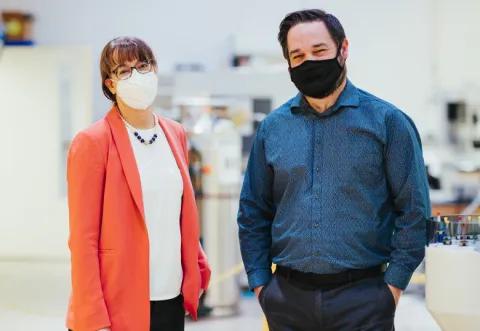Research group patenting urinary analysis to diagnose concussion and enhance recovery protocols
Sport-related concussion (SRC) or traumatic brain injury (TBI) has become one of the most important issues in sport, affecting everyone from multi-million-dollar athletes to children playing at the minor level. From health to economics, SRC now influences the way games are played and governed and yet, the actual tools available to diagnose concussions are limited and mainly subjective.

Researchers at the Universities of Lethbridge and Calgary are looking to insert objectivity into that equation with a non-invasive test that examines specific metabolites in a player’s urine. The results not only indicate whether a player is concussed but determine when a player can return to sport and even possibly aid in personalized therapeutic strategies to enhance recovery.
Drs. Gerlinde Metz (Canadian Centre for Behavioural Neuroscience, University of Lethbridge), Chantel Debert (University of Calgary, Alberta Health Services) and Tony Montina (Department of Chemistry & Biochemistry, Director Magnetic Resonance Facility, U of L) have an approved provisional patent that allows them to focus on a panel of 18 specific urinary metabolites, which together give a biomarker signature for diagnosing SRC.
“Based on a little drop of urine, we can tell if someone has had a traumatic brain injury with very high accuracy,” says Metz, Board of Governors Research Chair in Neuroscience. “With further testing, we can also say if someone has recovered from their injury and is able to move on with their lives.”
Urine samples, which are fast and simple to collect, are analyzed using proton nuclear magnetic resonance metabolomics, which provides a quick and quantitative measurement of the metabolites. The changes observed can indicate the difference between a healthy brain and one suffering the effects of trauma. Metabolomic analysis has proven to be useful in identifying biomarkers for various conditions, including Alzheimer’s, Parkinson’s disease, brain cancer, epilepsy and more, but it has yet to be used as a diagnostic and prognostic tool for SRC.
The ramifications of such a test could literally be game-changing, allowing athletes to be tested quickly and diagnosed with much higher accuracy than traditional subjective tests. Montina, who runs the NMR facility at the U of L, sees the clinical translation of the technology in three parts.
“The first is the immediate, acute phase that most professional sports would be very interested in because it gives that quick diagnosis,” he says. “Our goal is to take this panel of metabolites and eventually develop a field test that would allow for evaluation on site.”
The second phase of the testing is to assess recovery, comparing biomarkers in the metabolites to baseline levels and those in the acute phase, thereby giving a reliable diagnosis for return to play.
“The third aspect we’ve been looking at involves rehabilitation strategies and personalized interventions,” says Montina. “Essentially, it’s looking for biomarkers that indicate the effectiveness of therapy. We’d look for changes in levels to tell us how well a therapy is working, allowing for targeted therapeutics to speed up the recovery process for athletes so they can get back to their sport.”
While urinary analysis has been used to identify one metabolite or biomarker to help diagnose TBI, their group’s use of NMR technology has identified a full panel of metabolites that offer the most predictive fingerprint for TBI.
“By finding these multi-level signatures, we believe these are much more reliable for practical use,” adds Metz.
The next phase for the group is to secure additional funding as they seek licensing opportunities with biotech companies to continue testing and finalize the patent. Their initial work has included samples primarily from 16-year-old male hockey players. Eventually, with more samples and testing, they expect to create standardized curves that represent baseline and acute biomarker levels across gender and age.
“We’re very early in this process and very excited about its potential,” says Metz. “We want our tests to work effectively for males, females, different ages and different neurological conditions. With collaborators, such as Dr. Debert, who have access to different patient populations, we’ll really be able to cover more ground.”
To view online: https://www.ulethbridge.ca/unews/article/research-group-patenting-urinary-analysis-diagnose-concussion-and-enhance-recovery-protocols
PHOTO — Dr. Gerlinde Metz, left, and Tony Montina.
-- 30 --
Contact:
Trevor Kenney, News & Information Manager
403-360-7639 (cell)
trevor.kenney@uleth.ca
@uLethbridge
